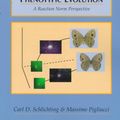
Phenotypic Evolution: A Reaction Norm Perspective
Carl D. Schlichting
Understanding the process of adaptive evolution of phenotypes is a fundamental problem in evolutionary biology. It has been approached from the point of view of population and quantitative genetics, optimality theory, or developmental biology. In the last decade, there has been an explosion of research on phenotypic plasticity (the environmentally induced production of different phenotypes by a single genotype) as well as on the molecular details of development, reflecting the increased recognition of their importance in shaping phenotypic evolution. However, the "hardening" of the neodarwinian synthesis in the '40s led to the largely independent investigation of genetic, developmental and environmental bases of phenotypic expression. As a result, these different perspectives have not been integrated into a satisfying cohesive view of phenotypic evolution. Phenotypic Evolution explicitly recognizes organisms as complex genetic-epigenetic systems developing in response to changing internal and external environments. As a key to a better understanding of how phenotypes evolve, the authors have developed a framework that centers on the concept of the Developmental Reaction Norm. This encompasses their views: (1) that organisms are better considered as integrated units than as disconnected parts (allometry and phenotypic integration); (2) that an understanding of ontogeny is vital for evaluating evolution of adult forms (ontogenetic trajectories, epigenetics, and constraints);
Booko found 1 book edition
Product filters
Booko collects this information from user contributions and sources on the internet - it is not a definitive list of editions. Search Booko for other editions of Phenotypic Evolution: A Reaction Norm Perspective.



















